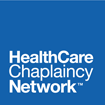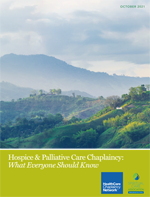
Hospice & Palliative Care Chaplaincy: What Everyone Should Know
This foundational paper provides extensive evidence-based guidance for hospice and palliative care organizations seeking to determine the value that Board Certified Chaplains bring to their patients, family members, the medical team, and their organization. The authors present compelling evidence that comprehensive spiritual care is best provided by professional chaplains who have undergone Clinical Pastoral Education (CPE) and certification by a major national certifying body.

Hospice Spiritual Care Leadership: Developing A Chaplaincy and Spiritual Care Education Department
This white paper is a call for Board Certified Chaplains to be hired into leadership roles at hospice organizations. The authors envision a Department of Chaplaincy and Spiritual Care Education (DCSCE) within hospice to foster the integration of spiritual care widely, to oversee compassionate interventions of staff support, and to deploy a network of caregivers for patient and family support. With a seasoned spiritual leader at the helm, the DCSCE will consider spiritual care to be a key component in providing holistic care and will ensure that quality spiritual care is provided to all persons.
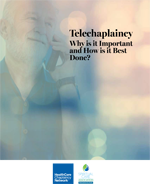
Telechaplaincy: Why is it Important and How is it Best Done?
This document represents the consensus of a panel convened by the Spiritual Care Association on the process and practice of telechaplaincy. While there have been several reports representing the practice of individual chaplains and one focused on the experience in Australia, this document represents the first time a group of experts including non-chaplains examine the evidence and report a consensus opinion. The document can be seen as consisting of two primary emphases. We believe it is important to reaffirm what is currently understood to be best practice in health care chaplaincy. This affirmation underlines that those processes and practices are equally applicable, and in some cases more so, for telechaplaincy than in face-to-face contacts. Second, there clearly are processes and practices that differentiate telechaplaincy visits from face-to-face visits. One way to summarize this difference is to suggest that while much about the practice of telechaplaincy is the same as face-to-face chaplaincy and requires the traditional knowledge and skills, there is much that is new and requires new knowledge and skills. In this document, we will name the former but focus on amplifying the latter.
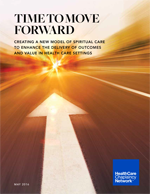
Time to Move Forward: Creating a New Model of Spiritual Care to Enhance the Delivery of Outcomes
This paper is a clarion call for the profession of chaplaincy to realize the need to look beyond the bedside. Chaplains must consider the expectations and mountain pressure to demonstrate and articulate how we uniquely contribute to metrics such as patient satisfaction, patient experience, medical outcomes, and cost savings. Chaplains must be familiar with the relevant published evidence, and be able to translate that to stakeholders in their organizations in ways that demonstrate added value.
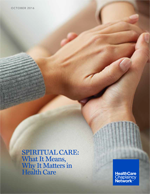
Spiritual Care: What It Means, Why It Matters in Health Care
This paper is a functional literature review and discussion of the published evidence demonstrating the unique contributions of chaplaincy care within the field of health care. With extensive bibliography supporting each section, chaplains can learn about what the evidence says about relevant definitions, the overall paradigm of spiritual care generalists and specialists, spiritual well-being, patient satisfaction, the role of the board-certified chaplain on the interprofessional team, and the the bottom line impact of chaplaincy care
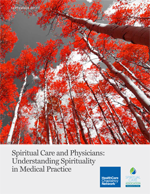
Spiritual Care and Physicians: Understanding Spirituality in Medical Practice
This paper reminds physicians that whole person care, biopsychosocial-spiritual care, includes intentional, pro-active care of the spirit. The scope of practice for the physicians includes understanding that patients and families are impacted by spirituality and religion, addressing it as a part of routine clinical interactions, and knowing when to refer for more in depth specialized spiritual care by the spiritual care specialist – often the chaplain – on the interprofessional team.
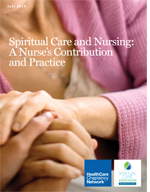
Spiritual Care and Nursing: A Nurse’s Contribution and Practice
Nurses often intuitively understand the importance of spirituality for the patients and families they serve, yet often find obstacles in knowing when and how to address spiritual care themselves, as well as when to refer to the spiritual care specialist on their team. This paper reviews the research relating to spiritual care and nursing practice and argues persuasively that spirituality should be a priority for nurses in their routine clinical care. Nurses can also learn some basic spiritual care tools for how to incorporate spirituality more explicitly in their daily practice.
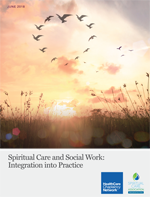
Spiritual Care and Social Work: Integration into Practice
Because social work and chaplaincy care overlap some in scope of practice and logistics, it is important to be able to articulate clearly defined roles, definitions, and research as it relates to spiritual care in health care. This paper, co-written by experts in both fields, reviews the extensive literature of both disciplines and provides social workers guidance in better understanding the importance of spirituality, how to integrate appropriate spiritual care into their clinical practice, and ways in which to work collaboratively with the board certified chaplains on their team.

The Chaplaincy Taxonomy: Standardizing Spiritual Care Terminology
Value-based health care requires chaplains to demonstrate that their services contribute to specific outcomes, which in turn uniquely contribute to high-quality evidence-based best healthcare practice. In order to be able to demonstrate value, professional chaplaincy needs a common language of what they do, how they do it, and why it matters. This paper lays out the Chaplaincy Taxonomy, explains how to use it, and how using it will help not only the patients and families being served, but ultimately the profession.
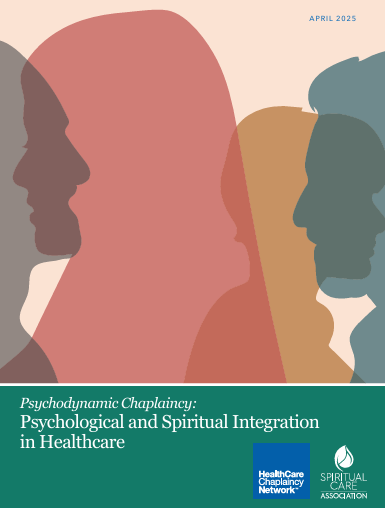
Psychodynamic Chaplaincy: Psychological and Spiritual Integration in Healthcare
Psychodynamic chaplaincy incorporates principles of psychoanalytic theory into the practice of spiritual care. It explores unconscious dynamics in human relationships and how past experiences shape present emotions and behaviors. Drawing from Boisen’s concept of the “living human document,” it invites deep engagement with the inner world of those receiving care.

